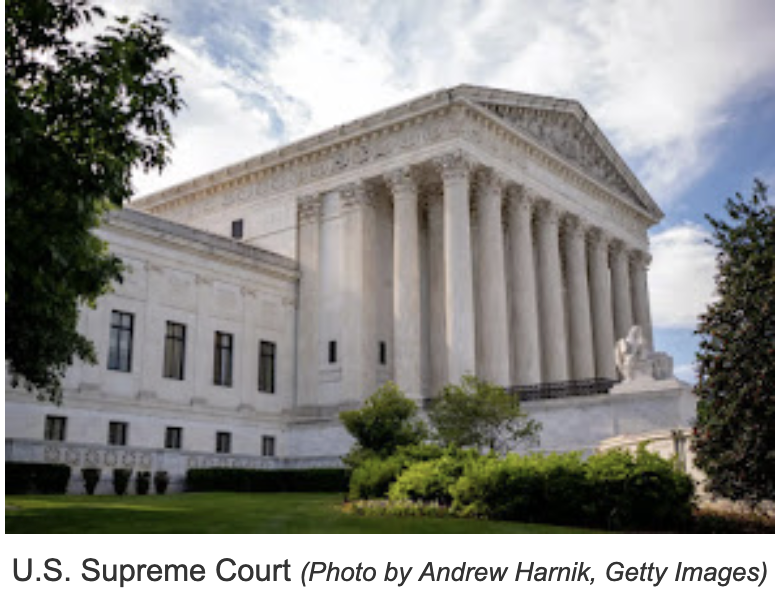Supreme Court allows government efforts against controversial social-media posts, saying plaintiffs lack standing to sue

By Mark Sherman
Associated Press
The Supreme Court on Wednesday sided with the Biden administration in a dispute with Republican-led states over how far the federal government can go to combat controversial social media posts on topics including Covid-19 and election security.
By a 6-3 vote, the justices threw out lower-court rulings that favored Louisiana, Missouri and other parties in their claims that officials in the Democratic administration leaned on social-media platforms to unconstitutionally squelch conservative points of view.
Justice Amy Coney Barrett wrote for the court that the states and other parties did not have the legal right, or standing, to sue. Justices Samuel Alito, Neil Gorsuch and Clarence Thomas dissented.
The decision should not affect typical social media users or their posts.
The case is among several before the court this term that affect social media companies in the context of free speech. Earlier cases over state laws and the one that was decided Wednesday are variations on the same theme, complaints that the platforms are censoring conservative viewpoints.
The states had argued that White House communications staffers, the surgeon general, the FBI and the U.S. cybersecurity agency are among those who applied “unrelenting pressure” to coerce changes in online content on social media platforms.
The justices appeared broadly skeptical of those claims during arguments in March and several worried that common interactions between government officials and the platforms could be affected by a ruling for the states.
The Biden administration underscored those concerns when it noted that the government would lose its ability to communicate with the social media companies about antisemitic and anti-Muslim posts, as well as on issues of national security, public health and election integrity.
White House press secretary Karine Jean-Pierre said the court reached the right outcome because “it helps ensure the Biden Administration can continue our important work with technology companies to protect the safety and security of the American people, after years of extreme and unfounded Republican attacks on public officials who engaged in critical work to keep Americans safe.”
Louisiana Attorney General Liz Murrill said the decision “gives a free pass to the federal government to threaten tech platforms into censorship and suppression of speech that is indisputably protected by the First Amendment. The majority waves off the worst government coercion scheme in history.”
The justices did not weigh in on the substance of the states’ claims or the administration’s response in their decision Wednesday.
“We begin — and end — with standing,” Barrett wrote. “At this stage, neither the individual nor the state plaintiffs have established standing to seek an injunction against any defendant. We therefore lack jurisdiction to reach the merits of the dispute.”
In dissent, Alito wrote that the states amply demonstrated their right to sue. “For months, high-ranking government officials placed unrelenting pressure on Facebook to suppress Americans’ free speech. Because the court unjustifiably refuses to address this serious threat to the First Amendment, I respectfully dissent.”
Nina Jankowicz was named in the original lawsuit after being appointed in 2022 to lead a new board in the Department of Homeland Security to tackle disinformation. The board was dissolved within weeks, amid conspiracy theories and criticism from Republicans and conservative activists who saw the effort as a political tool to regulate free speech.
Jankowicz, an expert in disinformation, said the Supreme Court had done what she had expected, but she said the damage from the lawsuit is not easily fixed.
“Unfortunately, there is an entire class of people that now believes the government, in coordination with independent researchers, is censoring some part of the American population,” she said. “I don’t think that’s going to go away anytime soon.”
The decision comes as many social media companies have removed guardrails against hate and disinformation. The platform X, owned by Elon Musk, has restored the accounts of conspiracy theorists and extremists who were previously banned. It also has gutted teams that once fought misinformation on the platform, leaving the community of users to moderate itself.
Meta, which owns Facebook and Instagram, no longer emphasizes news and political content on its platforms after facing years of accusations that it mishandles misinformation and contributes to political polarization.
The decision means that the Food and Drug Administration “can continue coordinating directly with social-media platforms,” reports Jessica Karins of Inside Health Policy.
“The justices said the plaintiffs lacked standing to sue because they could not show the removal of their social-media content or bans on their accounts were undertaken as the result of government pressure. Rather, the removal was the result of an independent decision-making process that considered government feedback — even if strongly worded — as one of many factors.”
The dissenters argued “that the government undertook a major campaign of censorship and that the majority is allowing a significant restriction on free speech to remain in place,” Karins reports.
The decision “says the plaintiffs’ allegations of injury depend on actions taken by the social-media platforms, but instead of suing the platforms, the plaintiffs sought to enjoin government agencies and officials from communicating with platforms on misinformation,” Karins notes. “Barrett wrote that this contradicts the principle that courts cannot redress injury caused by a third party not before the court.”
In friend-of-the-court briefs, the American Academy of Pediatrics, the American Medical Association, the American Academy of Family Physicians and other health organizations “emphasized the government’s compelling interest in fighting misinformation about vaccination, since many of the social media posts at issue were about Covid-19 vaccines,” Karins reports.
Kentucky Health News is an independent news service of the Institute for Rural Journalism and Community Issues, based in the School of Journalism and Media at the University of Kentucky, with support from the Foundation for a Healthy Kentucky.
Donate to Kentucky Health News here.